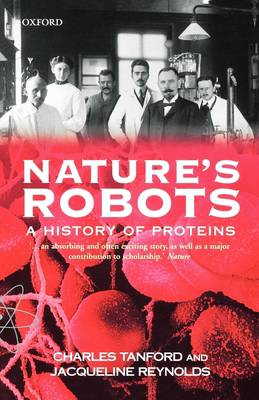
- Retrait gratuit dans votre magasin Club
- 7.000.000 titres dans notre catalogue
- Payer en toute sécurité
- Toujours un magasin près de chez vous
- Retrait gratuit dans votre magasin Club
- 7.000.0000 titres dans notre catalogue
- Payer en toute sécurité
- Toujours un magasin près de chez vous
Description
Proteins are amazing molecules. They spark the chemical reactions that form the basis for life, transmit signals in the body, identify and kill foreign invaders, form the engines that make us move, record visual images. For every task in a living organism, there is a protein designed to carry it out.
Nature's Robots is an authoritative history of protein science, from the earliest research in the nineteenth century to the most recent findings today. Tanford and Reynolds, who themselves made major contributions to the golden age of protein science, have written a remarkably vivid account of this history. The authors begin with the research of Berzelius and Mulder into "albumins," the early name for proteins, and the range all the way up to the findings of James Watson and Francis Crick. It is a fascinating story, involving heroes from the past, working mostly alone or in small groups, usually with little support from formal research grants. They capture the growing excitement among scientists as the mysteries of protein structure and function--the core of all the mysteries of life--are revealed little by little. And they include vivid portraits of scientists at work--two researchers, stranded by fog in a Moscow airport, strike up a conversation that leads to a major discovery; a chemist working in a small lab, with little funding, on a problem no one else would tackle, proves that enzymes are proteins--and wins the Nobel Prize.
Written in clear and accessible prose, Nature's Robots will appeal to anyone interested in the peaks and valleys of scientific research.
Nature's Robots is an authoritative history of protein science, from the earliest research in the nineteenth century to the most recent findings today. Tanford and Reynolds, who themselves made major contributions to the golden age of protein science, have written a remarkably vivid account of this history. The authors begin with the research of Berzelius and Mulder into "albumins," the early name for proteins, and the range all the way up to the findings of James Watson and Francis Crick. It is a fascinating story, involving heroes from the past, working mostly alone or in small groups, usually with little support from formal research grants. They capture the growing excitement among scientists as the mysteries of protein structure and function--the core of all the mysteries of life--are revealed little by little. And they include vivid portraits of scientists at work--two researchers, stranded by fog in a Moscow airport, strike up a conversation that leads to a major discovery; a chemist working in a small lab, with little funding, on a problem no one else would tackle, proves that enzymes are proteins--and wins the Nobel Prize.
Written in clear and accessible prose, Nature's Robots will appeal to anyone interested in the peaks and valleys of scientific research.
Spécifications
Parties prenantes
- Auteur(s) :
- Editeur:
Contenu
- Nombre de pages :
- 324
- Langue:
- Anglais
- Collection :
Caractéristiques
- EAN:
- 9780198606949
- Date de parution :
- 29-01-04
- Format:
- Livre broché
- Format numérique:
- Trade paperback (VS)
- Dimensions :
- 128 mm x 194 mm
- Poids :
- 222 g

Les avis
Nous publions uniquement les avis qui respectent les conditions requises. Consultez nos conditions pour les avis.






